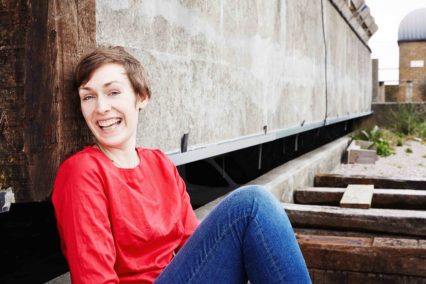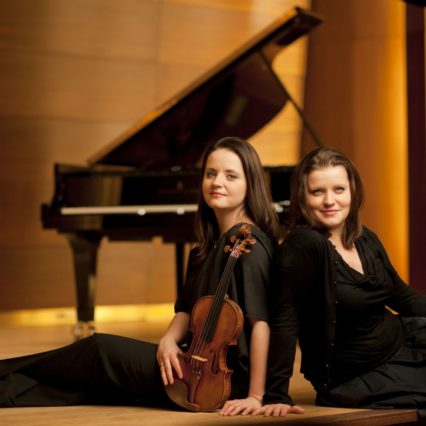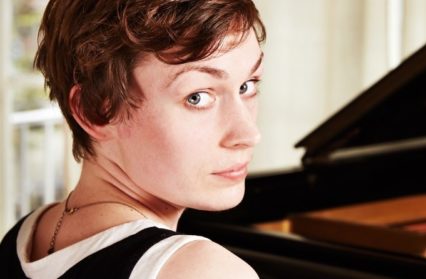BBC National Orchestra of Wales: International Women’s Day Concert
BBC Hoddinott Hall, Cardiff, 8 March 2017
BBC National Orchestra and Chorus of Wales
Côr y Cwm Children’s Choir
Soloists: Baiba Skride (violin); Lauma Skride (piano)
Conductor: Xian Zhang
Leader: Lesley Hatfield
Kate Whitley – Speak Out (2016) (World premiere)
Felix Mendelssohn – Concerto for Violin, Piano and Strings (1823)
Alexander Zemlinsky – The Mermaid (1902/3)
A new work by an up-and-coming woman composer, set to words by an inspirational young woman, was the draw for this concert. At the age of 15, while travelling to school on a bus, Malala Yousafzai was shot in the head by Taliban gunmen because of her campaign for girls’ rights to education. She refused to be cowed and, once she had recovered, continued to speak out. Kate Whitley chose to set words from Malala’s 2013 speech to the UN Youth Assembly in her commission from BBC Radio 3 for this year’s International Women’s Day.

The result is Speak Out, a 10-minute piece for large orchestra, mixed adult and children’s choirs. The work is a powerful statement, full of kinetic energy. The waves of sound from the orchestra carry the words sung by the choirs, and sometimes submerge them. The sound dies to almost nothing and swells again. The piece makes the struggle tangible, with the insistent repetition of the words “Let us” carrying the force of Malala’s message that voices will not be silenced.
The first vocal statement is made by the Rhondda-based Côr y Cwm children’s choir alone. Their sound is confident and strong and Kate Whitley’s previous experience in writing for children’s voices is apparent. Her word-setting for them is straightforward and pleasingly melodic. As the women and men of the BBC National Chorus of Wales join in, the vocal lines divide, to come back to a unison crescendo with full orchestral forces on the words “And out of that silence comes thousands of voices”.
In the final section of the piece the children sing, as in a playground chant, the words “Today is the day of every woman, every man, every boy and every girl” and “Today is the day we speak out”. The work ends with a rushing orchestral motif. The impact of the whole is as a rallying call, an aural illumination of Malala’s words.

The BBC National Orchestra of Wales were conducted in this concert by their principal Guest Conductor Xian Zhang, which was only fitting on this International Women’s Day. And it was equally fitting to have two women taking the solo parts in the Concerto for Violin, Piano and Strings which followed. Latvian sisters Baiba and Lauma Skride were mesmeric in their virtuosic playing, by turns cut-glass and liquid in texture. The support from the strings of the orchestra was superb, the players achieving a remarkable unanimity of sound given their numbers.
But – and there is a big but – the concerto in question was by Felix Mendelssohn. Nothing wrong with that on another day, in another concert. But why was a concert for International Women’s Day not made up entirely of works by women composers? This work was written by Mendelssohn when he was 14. So, a link with Malala’s youth and energy perhaps. But that does not justify its inclusion in this concert. As I entered the Hoddinott Hall to take my seat for the performance I overheard another member of the audience wondering out loud why it was Felix Mendelssohn who was represented and not his sister Fanny. Exactly.
The ironic thing is that Lauma Skride, piano soloist in this work, has made an award-winning recording of Fanny Mendelssohn Henshel’s piano cycle Das Jahr. Actually Fanny’s work did receive attention on this International Women’s Day. Her Easter Sonata, previously wrongly attributed to her brother, was given its first UK performance in a concert at the Royal College of Music broadcast as the Radio 3 Lunchtime Concert on the day. So hurrah for that, and for the attention which her descendant, writer and film-maker Sheila Hayman is drawing to Fanny’s compositions.

Meanwhile, back in Hoddinott Hall, Baiba and Lauma Skride gave an encore of a Berceuse (1898) for violin and piano by American composer Amy Beach. A beautiful lullaby, tenderly played, and hurrah too for the Skride sisters for making this unscheduled addition to the concert.
The final work in the concert was another baffling choice, Zemlinsky’s late-Romantic tone-poem The Mermaid. Wallowing in misery after Alma Schindler left him for Mahler, Zemlinsky composed this overblown work depicting the story of Hans Christian Andersen’s ‘The Little Mermaid’. Not by a woman, nothing to do with women, and no connection with the other works in the programme. Plenty of spotlights on sections of the (now even larger) orchestra, including seven horns (all played by men), and a solo spot for Leader Lesley Hatfield depicting the mermaid. We were given to understand by BBC presenter Nicola Heywood Thomas that the work is a great favourite of the conductor Xian Zhang. She certainly conducted it like Prospero conjuring a storm, and the members of the orchestra responded with gusto.
BBC Radio 3 did a good job in their scheduling of music by woman composers in their broadcasts on this International Women’s Day, and involving contemporary woman composers in curating some of their regular programmes such as Errollyn Wallen in In Tune. Full credit to them too for the commission of Kate Whitley’s Speak Out. But, much as I enjoyed this and also the performance of the Skride sisters, here was an opportunity inexplicably missed to showcase in live performance more of the work of women composers.
Header photo of Kate Whitley: Ambra Vernuccio



 Enjoyed this article? Support our writers directly by buying them a coffee and clicking this link.
Enjoyed this article? Support our writers directly by buying them a coffee and clicking this link.







